Related Research Articles

Simon & Garfunkel were an American folk rock duo consisting of the singer-songwriter Paul Simon and the singer Art Garfunkel. They were one of the best-selling music groups of the 1960s, and their biggest hits—including the electric remix of "The Sound of Silence" (1965), "Mrs. Robinson" (1968), "The Boxer" (1969), and "Bridge over Troubled Water" (1970)—reached number one on singles charts worldwide.
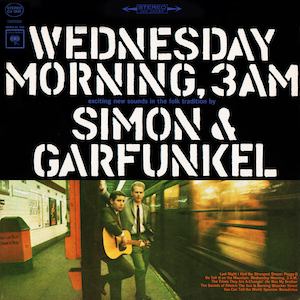
Wednesday Morning, 3 A.M. is the debut studio album by American folk rock duo Simon & Garfunkel. Following their early gig as "Tom and Jerry", Columbia Records signed the two in late 1963. It was produced by Tom Wilson and engineered by Roy Halee. The cover and the label include the subtitle exciting new sounds in the folk tradition. Recorded in March 1964, the album was released on October 19.
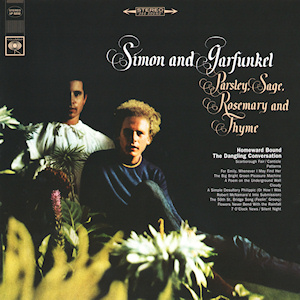
Parsley, Sage, Rosemary and Thyme is the third studio album by American folk rock duo Simon & Garfunkel. Produced by Bob Johnston, the album was released on October 24, 1966, in the United States by Columbia Records. Following the success of the re-release of their debut single "The Sound of Silence", Simon & Garfunkel regrouped after a time apart while Columbia issued their second album, a rushed collection titled Sounds of Silence. For their third album, the duo spent almost three months in the studio working on instrumentation and production.
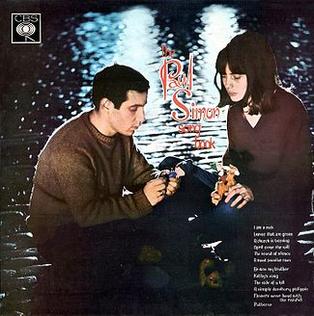
The Paul Simon Songbook is the debut solo studio album by Paul Simon. It was released in the UK in 1965. It was made available in the US as part of the LP box set Paul Simon: Collected Works (1981). The album was produced by Reginald Warburton and Stanley West as Columbia/CBS Records LP BPG 62579 in the UK; remastered CD Columbia/Legacy/SME CK 90281.
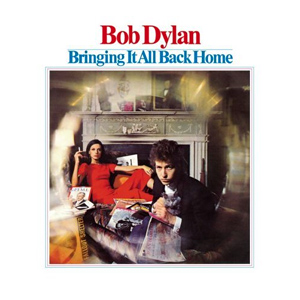
Bringing It All Back Home is the fifth studio album by American singer-songwriter Bob Dylan. It was released in March 1965 by Columbia Records. In a major transition from his earlier sound, it is Dylan's first album to incorporate electric instrumentation, causing controversy and dividing many in the contemporary folk scene.
"Scarborough Fair" is a traditional English ballad. The song lists a number of impossible tasks given to a former lover who lives in Scarborough, North Yorkshire. The "Scarborough/Whittingham Fair" variant was most common in Yorkshire and Northumbria, where it was sung to various melodies, often using Dorian mode, with refrains resembling "parsley, sage, rosemary and thyme" and "Then she'll be a true love of mine." It appears in Traditional Tunes by Frank Kidson published in 1891, who claims to have collected it from Whitby.

"The Sound of Silence" is a song by the American music-duo Simon & Garfunkel, written by Paul Simon. The duo's studio audition of the song led to a record deal with Columbia Records, and the original acoustic version was recorded in March 1964 at Columbia's 7th Avenue Recording Studios in New York City for their debut album, Wednesday Morning, 3 A.M., released that October to disappointing sales.
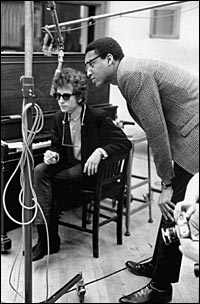
Thomas Blanchard Wilson Jr. was an American record producer best known for his work in the 1960s with Bob Dylan, the Mothers of Invention, Simon & Garfunkel, the Velvet Underground, Cecil Taylor, Sun Ra, Eddie Harris, Nico, Eric Burdon and the Animals, the Blues Project, the Clancy Brothers and Tommy Makem, and others.
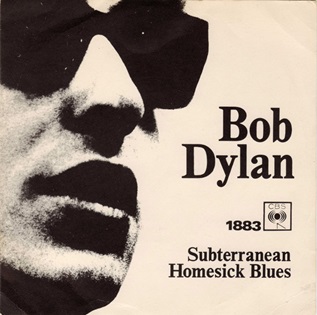
"Subterranean Homesick Blues" is a song by Bob Dylan, recorded on January 14, 1965, and released as a single by Columbia Records, catalogue number 43242, on March 8. It was the lead track on the album Bringing It All Back Home, released some two weeks later. It was Dylan's first Top 40 hit in the United States, peaking at number 39 on the Billboard Hot 100. It also entered the Top 10 of the UK Singles Chart. The song has subsequently been reissued on numerous compilations, the first being the 1967 singles compilation Bob Dylan's Greatest Hits. One of Dylan's first electric recordings, "Subterranean Homesick Blues" is also notable for its innovative music video, which first appeared in D. A. Pennebaker's documentary Dont Look Back. An acoustic version of the song, recorded the day before the single, was released on The Bootleg Series Volumes 1–3 1961–1991.

"I Am a Rock" is a song written by Paul Simon. It was first performed by Simon alone as the opening track on his album The Paul Simon Songbook which he originally recorded and released in August 1965, only in the United Kingdom. Paul Simon and Art Garfunkel, as the American folk rock duo Simon & Garfunkel, re-recorded it on December 14, 1965, and included as the final track on their album Sounds of Silence, which they released on January 17, 1966. It was released as a single in 1966, and subsequently included as the B-side of the 1971 A-side reissue of "The 59th Street Bridge Song ".
Roy Decker Halee is an American record producer and engineer, best known for working with Simon & Garfunkel, both as a group and for their solo projects.
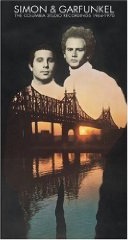
The Columbia Studio Recordings (1964–1970) is the third box set of Simon & Garfunkel recordings, released in 2001 by Columbia Records. This 5-CD set contains all of their studio albums from 1964 to 1970. The CDs are packaged in miniature recreations of the original LP jackets, and an annotated booklet is also included.

"The 59th Street Bridge Song (Feelin' Groovy)" is a song by folk rock duo Simon & Garfunkel, written by Paul Simon and originally released on their 1966 album Parsley, Sage, Rosemary and Thyme. Cash Box called it a "sparkling, spirited lid".

Old Friends is the second box set of Simon & Garfunkel songs, released in November 1997. The three-disc anthology collects most of the duo's best-known works, and also includes previously unreleased outtakes. Some of these outtakes subsequently appeared on both the reissues of Simon & Garfunkel's five studio albums as well as the later boxed set The Columbia Studio Recordings (1964-1970).

Sounds of Silence is the second studio album by American folk rock duo Simon & Garfunkel, released on January 17, 1966. The album's title is a slight modification of the title of the duo's first major hit, "The Sound of Silence", which originally was released as "The Sounds of Silence". The song had earlier been released in an acoustic version on the album Wednesday Morning, 3 A.M., and later on the soundtrack to the movie The Graduate. Without the knowledge of Paul Simon or Art Garfunkel, electric guitars, bass and drums were overdubbed by Columbia Records staff producer Tom Wilson on June 15, 1965. This new version was released as a single in September 1965, and opens the album.
"Patterns" is a song written by Paul Simon and included on his 1965 album The Paul Simon Songbook, and later recorded by Simon and Garfunkel on their third album, Parsley, Sage, Rosemary and Thyme. The lyrics are about how life is a labyrinthine maze, following patterns which are, because we are trapped in them, difficult to unravel or control.

"For Emily, Whenever I May Find Her" is a song written by Paul Simon and recorded by American music duo Simon & Garfunkel on their third studio album, Parsley, Sage, Rosemary and Thyme (1966). It is sung solely by Art Garfunkel, and consists mainly of his vocals with heavy reverb and a 12-string acoustic guitar. The lyrics concern finding a lover, although Simon once characterized the subject matter as being about a "belief," rather than about a specific individual.
Robert J. Gregg was an American musician who performed as a drummer and record producer. As a drum soloist and band leader he recorded one album and several singles, including one Top 40 single in the United States. But he is better known for his work as a drummer on several seminal 1960s songs, including Bob Dylan's "Like a Rolling Stone" and Simon and Garfunkel's "The Sound of Silence". He was also temporarily a member of the Hawks, which later became known as the Band.
"April Come She Will" is a song by American music duo Simon & Garfunkel from their second studio album, Sounds of Silence (1966). It originally appeared on the solo album The Paul Simon Songbook. It is the B-side to the hit single "Scarborough Fair/Canticle". It is included on The Graduate soundtrack album and was additionally released on the "Mrs. Robinson" EP in 1968, together with three other songs from The Graduate film: "Mrs. Robinson", "Scarborough Fair/Canticle", and "The Sound of Silence".
References
- ↑ Dimery, Robert (ed.) (2005). 1001 Albums You Must Hear Before You Die . Milan: Universe Publishing, p. 94. First edition, 2005.
- ↑ "The Simon & Garfunkel song that parodies Bob Dylan". 2021-09-29. Retrieved 2021-10-13.
- ↑ McAlpine, Fraser (2018-04-13). "10 of the weirdest song titles, and the stories behind them - BBC Music". www.bbc.co.uk. Retrieved 2021-10-13.
- ↑ "Definition of desultory | Dictionary.com". www.dictionary.com. Retrieved 2021-09-28.
- 1 2 Simon & Garfunkel interviewed on the Pop Chronicles (1969)